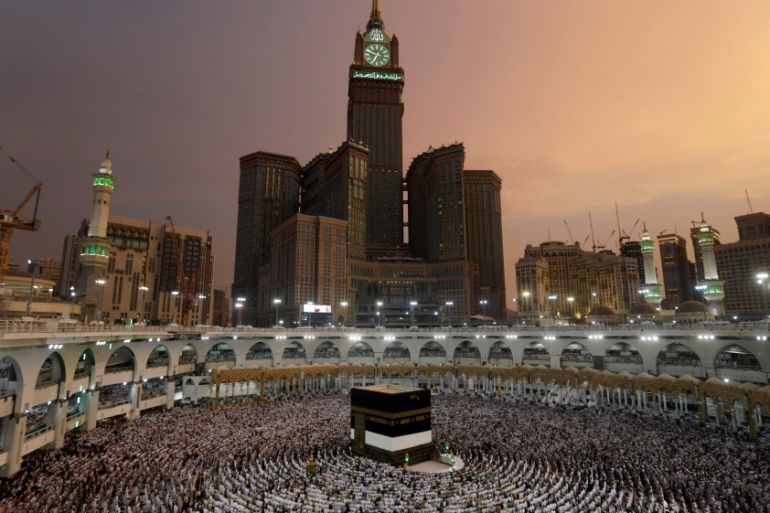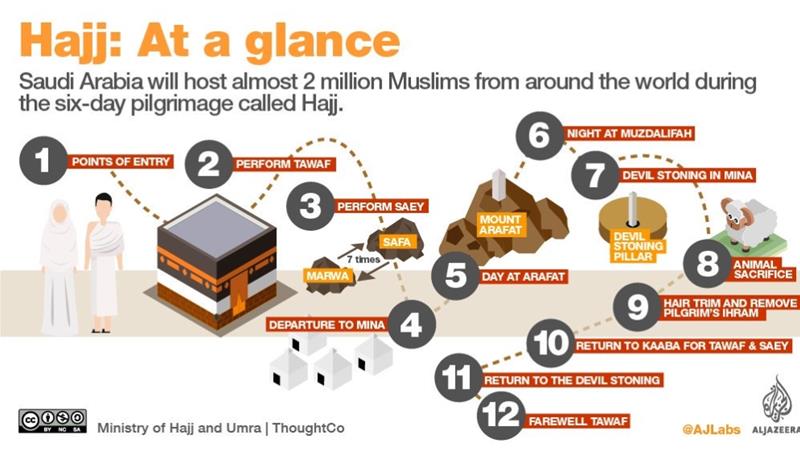Two million Muslims gather near Mecca for Hajj
Crowds visit Mount Arafat to spend day in contemplation where Prophet Muhammad is said to have delivered final sermon.

Around two million Muslims are gathering near Saudi Arabia’s Mecca for the peak day of the annual Hajj pilgrimage.
From dawn to dusk on Thursday, the crowd will visit Mount Arafat to spend the day in supplication and contemplation.
Keep reading
list of 4 itemsMuslim pupil loses UK court bid over Michaela school prayer rituals ban
Photos: Sikhs celebrate harvest festival of Baisakhi, marking new year
Masses gather for Eid celebrations in India
Muslims believe Prophet Muhammad delivered his final sermon on the granite hill more than 1,400 years ago.
“We hope that Allah will forgive our sins, and we hope to have a new start with our God,” Khaled Ahmed, a 47-year-old pilgrim from Egypt, told the Associated Press news agency.
In his sermon, the prophet is believed to have called on his followers to repay their debts, beware of Satan, perform five daily prayers, fast during the month of Ramadan and give to charity.
He also called on those with the means to do so to perform the Hajj once in a lifetime and reminded worshippers of women’s rights.
![Muslims believe Prophet Muhammad delivered his final sermon on the granite hill more than 1,400 years ago [Suhaib Salem/Reuters]](/wp-content/uploads/2017/08/f80eecb1a4bb468aafa81bb6cb8c5211_18.jpeg)
No ethnic group or race has superiority over another, except in piety and good action, he is quoted in Islamic texts as saying.
During the Hajj, male pilgrims are required to wear seamless, white terrycloth garments for the entirety of the pilgrimage.
Women wear loose clothing, cover their hair and forgo makeup and nail polish to achieve a state of humility and spiritual purity.
Noura Sulieman, a pilgrim from the Philippines, said she had been to the Hajj several times before and was praying for her family.
“I came here to Arafat to pray for my family, for my daughter, and my son, and all my family, and all the Philippine Muslims, and all Muslims in all countries,” she said. “God willing, Allah will accept our pilgrimage.”
READ MORE: Hopes fade for Qatar residents to perform Hajj
As Eid approaches, however, hope faded for residents of Qatar who wanted to perform Hajj following the Gulf diplomatic crisis.
“I want[ed] to go on Hajj but I am not allowed,” Mohammed Shafiq, a resident of Doha from Pakistan, told Al Jazeera.
“The Saudi embassy is closed so how am I supposed to go? … I am an old man [this could be my last chance] and maybe I will die tomorrow,” said Shafiq, who has been working hard to finance his once-in-a-lifetime trip to Mecca.
Hajj is the fifth and final pillar of Islam, and is mandatory for Muslims who are able to perform the pilgrimage.
